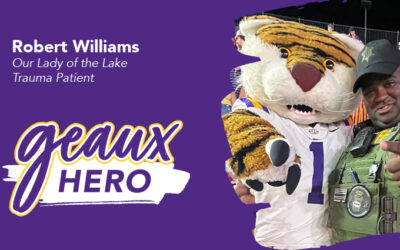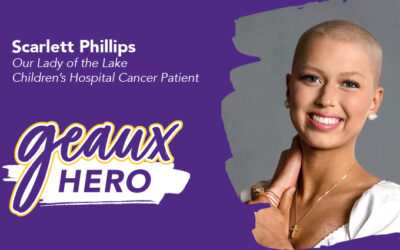Cancer survivorship doesn’t begin when the last treatment ends. It begins the moment a person hears the words, “You have cancer.”
That’s the philosophy guiding oncology survivorship navigator Jimmie Wells, MSN, RN, OCN, and her work at St. Dominic Hospital. Cancer survivorship is a lifelong journey that requires compassion, education and connection every step of the way.
“Once you’ve heard those words and taken one more breath, you are a survivor” Wells says. “Survivorship is not about being finished. It’s about wherever you are in the journey.”
From Treatment Nurse to Survivorship Navigator
Wells has spent 39 years in oncology nursing, with the last 13 at St. Dominic Health. Though she briefly attempted retirement, she felt called to return — this time in a role that allows her to walk beside patients during one of the most overlooked parts of the cancer experience: life after treatment.
For Wells, this work is deeply personal and profoundly purposeful. She’s not just helping patients navigate the medical system. She’s helping them reclaim their sense of self.
“(Survivorship) is about understanding that there are physical, emotional and social side effects that can last long after treatment,” she says. “People need help reintegrating into their lives. They need someone to talk to who understands that the world doesn’t go back to normal overnight.”
Her mission, she says, is to remind people that even amid fear, fatigue and uncertainty, there is room for healing, for hope, and for a future.
“There’s a certain level of health and wellness that’s possible, no matter where you are in the process,” she says.
Whether she’s building personalized care plans, teaching nurses across Mississippi or simply being a voice of calm after a whirlwind of treatment, Wells is driven by the belief that cancer may change you, but it doesn’t define you.
Shoes That Don’t Fit Anymore
One patient stands out in Wells’ memory. A young woman had completed treatment but couldn’t shake the feeling that her old life didn’t fit anymore. Her frustration and sadness were palpable: her friends wanted her to go back to the way things were before cancer, but she felt changed.
“I told her it’s like trying to put on a pair of shoes that are just a little too tight,” Wells says. “You can’t go back to who you were because you’ve changed, inside and out. That conversation became an ‘aha’ moment for both of us.”
It’s moments like those that reveal what survivorship really means: helping patients adjust to a new normal while honoring what they’ve been through.
Educating and Empowering Nurses Across Mississippi
Wells doesn’t just support patients. She also ensures that her fellow nurses are equipped to care for cancer patients at every stage of the journey. Drawing from her experience teaching oncology, she developed a two-day “Oncology Overview” course at St. Dominic’s. Offered three times a year, it’s open to anyone — nurses, social workers, chaplains — regardless of where they work.
“Cancer care is complex. You don’t always learn these things in nursing school,” she says. “This course covers the basics: national standards, how to understand treatment side effects and how to support patients emotionally and physically. That’s survivorship, too — making sure patients are getting the best care from informed caregivers.”
Reaching the Community, One Conversation at a Time
Another passion for Wells is community outreach. As a longtime member of the Mississippi Comprehensive Cancer Control Group, she travels across the state to speak about cancer prevention, early detection and life after diagnosis.
She’s not just handing out pamphlets. She’s listening.
“When I go into the community, I learn as much as I teach,” Wells says. “I hear what people are really dealing with — what they believe, what they fear, what they need. And I make sure I share resources that make sense for their community. I might be from Jackson, but if I’m in Lexington or the Gulf Coast, I want to give them local help they can actually use.”
And when the opportunity arises, she introduces people to St. Dominic’s and the services it offers. But ultimately, she says, it’s about getting the right information into the right hands, wherever patients live.
A Culture of Compassionate Cancer Care
What sets St. Dominic’s apart, Wells says, is that the hospital recognizes survivorship as a core part of cancer care. While many navigators focus on treatment coordination, Wells’s sole focus is survivorship, a distinction that has allowed her to build unique programs for both patients and staff.
“Survivorship isn’t an afterthought here. It’s part of the whole plan,” she explains. “And we work as a team. If I’m helping someone who’s still in treatment and they’re struggling, I connect them with another navigator. We share responsibilities and support each other, just like we support our patients.”
Wells also emphasizes caregiver support, another often overlooked part of the cancer experience. Whether it’s a family member or a friend, caregivers need resources, education and rest.
“They often forget about themselves,” she says. “But they need to be well, too, to care for someone else. We help them build their own toolkit so they’re not just surviving the journey, they’re sustaining it.”
Cancer Survivorship Is a Lifelong Road
One message Wells wants every cancer patient, caregiver, support person and community member to know is that survivorship doesn’t come with an expiration date.
“You might be 10 years out from your diagnosis, and something comes up. You still need support. You still deserve answers,” she says. “Here at St. Dominic’s, we’re here to talk. Maybe we can’t solve everything, but we can listen. We can help you figure out what you need.”
Wells sees her role not as someone who fixes problems, but as someone who equips patients, families and fellow caregivers with the tools they need to navigate the road ahead.
“True success,” she says, “is when they can do it for themselves. We just help them build the ladder.”




